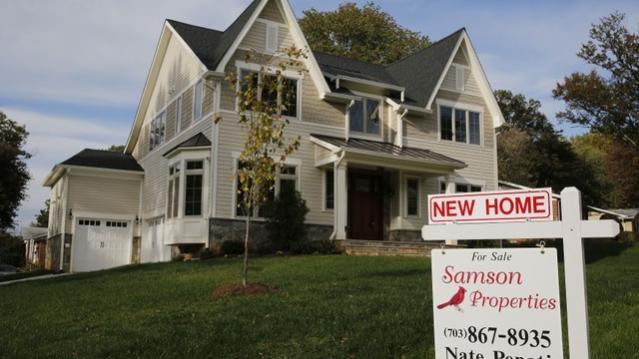Home Buying Gets Easier as Down Payments Dip

One hurdle to first-time homebuyers is starting to get a little lower: The average down payment for a home fell to less than 15 percent in the first quarter of 2015 to its lowest level since early 2012. The average down payment for the quarter was $57,710, according to RealtyTrac.
The lower down payments reflect new loan programs recently introduced by Fannie Mae and Freddie Mac, and lower insurance premiums for Federal Housing Authority Loans. The market is also adjusting as large, institutional investors who had been buying starter homes as rental investments dial back.
Related: U.S. Homeownership Dips, But Household Formation Rises
“Down payment trends in the first quarter indicate that first-time homebuyers are finally starting to come out of the woodwork, albeit gradually,” RealtyTrac vice president Daren Blomquist said in a statement.
Broken down by type of loan, the average down payment for conventional loans was 18.4 percent ($72,590), and the average down payment for FHA loans was just 2.9 percent ($7,609). FHA loans as a share of all mortgages increased from 21 percent in January to 25 percent in March.
Among the country’s largest counties, Wayne County in Detroit, Mich., had the lowest average down payment (12 percent), and New York had the highest (37 percent).
While lower down payments are good news for first-time homebuyers, they also are a reminder of practices that led to the housing bubble that began to burst in late 2006 and contributed to the financial crisis. During the height of the boom, buyers were able to purchase homes that they couldn’t really afford by putting little or no money down on the property.
Maybe Don’t Count Out Obamacare Repeal Just Yet

Sen. Bill Cassidy (R-LA) told reporters on Friday that he’s getting close to securing enough votes to pass the last-ditch ACA repeal and replacement bill he’s put forth with Sens. Lindsey Graham (R-SC), Dean Heller (R-NV) and Ron Johnson (R-WI).
“I am pretty confident we’ll get there on the Republican side,” Cassidy said. “We’re probably at 48-49 [votes] and talking to two or three more.” And Senate Majority Leader Mitch McConnell has asked the Congressional Budget Office to estimate the effects of the Cassidy-Graham bill, which would speed up the scoring process.
Of course, those last two or three votes have been the challenge for the GOP all along, and they may not be any easier to round up this time. Sen. Rand Paul (R-KY), who voted for a prior repeal bill, said Friday that he won't support this one. Plus, opponents are already stepping up their criticisms about the effects of the bill. And time is running out: Cassidy and his colleagues only have until September 30 to pass the bill this year under a process that would require only 50 supporters in the Senate. So while the Obamacare repeal may still have life, it remains a longshot.
Orrin Hatch Signals Just How Complicated Tax Reform Will Be

GOP leaders said Wednesday that they'd issue a more detailed framework of their tax overhaul the week of September 25. But while lawmakers are eager to get more details about the outline being hashed out by the so-called Big Six team of negotiators, Republicans are still divided on key elements of the plan — going from blueprint to bill is bound to be a contentious process.
In his opening remarks at a Senate Finance Committee hearing today on individual tax reform, Sen. Orrin Hatch (R-UT) said the plan from the Big Six — of which he is one — "will not dictate the direction" the tax-writing committee takes. "Anyone with any experience with the Senate Finance Committee knows that we are not anyone’s rubber stamp," he said. "If a bill – particularly on something as consequential as tax reform – is going to pass in this committee, the members of the committee will have to be involved in putting it together."
Oh, and remember: Republicans also need to agree on a budget before they can push through tax reform without Democratic votes.
Aging Baby Boomers Drive Down the Uninsured Rate
About 10,000 boomers turn 65 every day, becoming eligible for Medicare on their birthdays. The Census Bureau says that the sheer number of boomers entering Medicare is affecting the uninsured rate for the whole population. That rate fell to 8.8 percent in 2016, down from 9.1 percent a year earlier, with most of the decline driven by the aging of the post-war generation. (Wall Street Journal)
Social Security Kept 26.1 Million Out of Poverty Last Year
Social Security kept more than 26 million people out of poverty last year, according to a new report from the Census Bureau. Refundable tax credits such as the one for earned income kept 8.2 million people out of poverty, while food stamps lifted 3.6 million above the line, housing subsidies reduced the number of poor people by 3.1 million and unemployment insurance kept 680,000 out of poverty. Overall, the Census Bureau reported, the poverty rate was 12.7 percent, while a more sophisticated alternative measure that factors in government programs for low-income families put the rate at 13.9 percent, down from 14.5 percent in 2015.
Read more about the new Census Bureau numbers here.
Tax Reform on Menu for Trump's Dinner with Dems
President Trump is set to host three moderate Democratic senators for dinner on Tuesday as part of his push for tax reform, Politico reports. The Democrats on the guest list: Sens. Joe Manchin of West Virginia, Heidi Heitkamp of North Dakota and Joe Donnelly of Indiana, all of whom are up for reelection in 2018 in states Trump won last November. Vice President Mike Pence and GOP Sens. Orrin Hatch of Utah, John Thune of South Dakota and Pat Toomey of Pennsylvania are also slated to attend.
